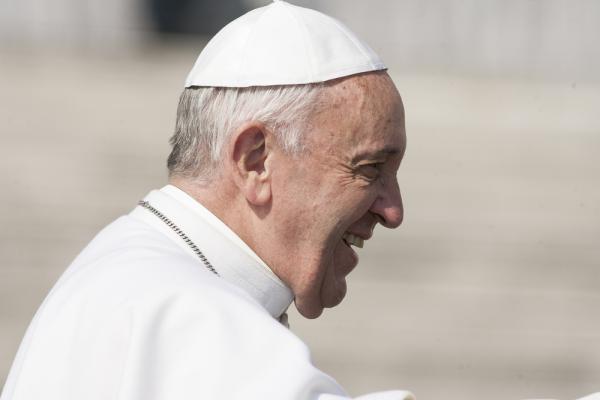Pope Francis’ ecological encyclical released today, and there are many reasons for hope. It’s encouraging to see a such a high-profile Christian leader taking a strong stand on both ecological issues and those of global poverty. I’m grateful for the way he is intertwining care for the earth and social justice, a message that draws deeply from and amplifies Catholic social teaching.
If we are to have a culture of life, it can’t stop with opposing abortion, capital punishment, and war. Our expression of Christ’s love must extend past personal piety and address the systemic sin that is increasingly tearing our world apart.
Because climate change has long been positioned in terms of the religion versus science culture wars, framing the issue as a moral crisis is a game-changer. To have the pope, by no means a liberal apologist, coming forward to address the ecological crisis is of profound significance.
For the Pope to address climate change from the perspective of Christian discipleship is precisely what this global conversation needs. Such a move has the potential to break down the false science versus religion dichotomy that has for so long demanded that we choose between our minds and our hearts. It might even have the potential to soften ancient divisions within the worldwide church.
Francis’ dynamic leadership prompts me to wonder anew about how the global body of Christ might be brought into unity. I have no illusions that the worldwide church will be reunited on an institutional level. (Even if it could be, there are questions in my mind about whether that would be a good thing.) Nevertheless, the humility, gentleness, and broad embrace of this pope encourages me to reevaluate my own sectarian tendencies, to seek more earnestly for ways to mend divisions wherever they estrange Christian brothers and sisters who desire to walk together in the way of Jesus.
By choosing to focus on the plight of the poor and the groaning of the earth itself, Francis is tapping into something much deeper than denominational squabbles and political maneuvering. He is seeking to make an end-run around the tedious shouting matches of privileged contenders in pitched ideological battles. This is a pope, not of the pundits but of the people – and of the planet.
We’re all connected. Just as the body of Christ is one – despite all of our institutional and ideological boundaries – all of humanity, all life is one. We’re rooted together in the soil that feeds us, in the natural ecosystems that sustain our very existence.
Just as we cannot claim to be walking in the way of Jesus while ignoring the cries of the poor and oppressed, we can no longer treat care for the creation as a tangential issue. The earth is groaning under the futility that we have subjected it to. The plants and insects and trees and fish – all of life is our brother, sister, mother. When we sin against the natural world, we sin against our own body.
It shouldn’t be at all surprising that a top Christian leader like Pope Francis is delivering a message of concern for the integrity of our whole planetary community, whether rich or poor, young or old, human or plant or fish or tree. This message flows organically from the heart of the gospel. Despite all the ways that Christians in the West have denied the goodness of God’s creation, the DNA of our story in Christ is one of profound love for the whole cosmos that God has made through his pre-existent Word.
I anticipate Pope Francis’ second encyclical as an opportunity to more deeply engage with this gospel message, drawing us into reconciliation with all life. I’m praying that we’ll accept the invitation to explore our responsibility, as followers of the crucified Jesus, to respond to the cries of the poor and the natural world in whom Jesus is being re-crucified daily.
How will we as friends of Jesus respond to this new teaching? Regardless of whether we are Catholic, Protestant, Eastern Orthodox, or some other group – how are we being called to open ourselves to the profound message that God is giving through his servant Francis? What would it mean to live at peace with one another, coming to know ourselves as one body in Christ, experiencing brother/sister-hood with all the living things that God has made?
Micah Bales is a writer, teacher, and grassroots Christian leader living in Washington, D.C. He is a founding member of Friends of Jesus, a new Quaker community, and has been an organizer with the Occupy movement. You can read more of his work at www.micahbales.com, or follow him on Twitter.
Image: Pope Francis, giulio napolitano / Shutterstock.com
Got something to say about what you're reading? We value your feedback!
